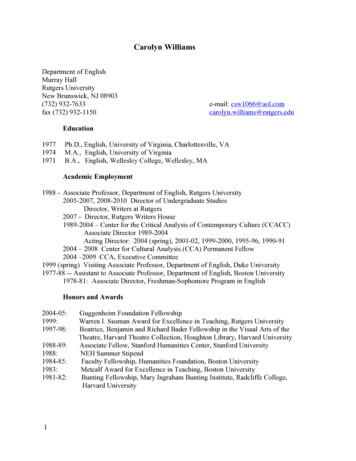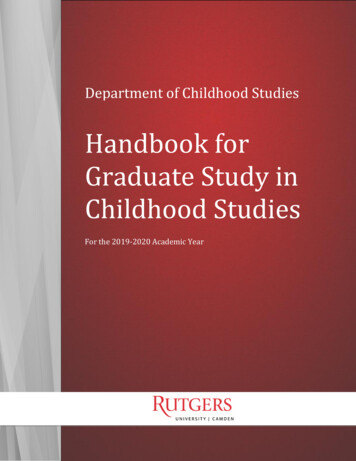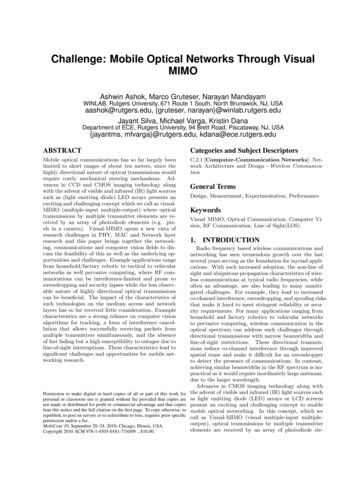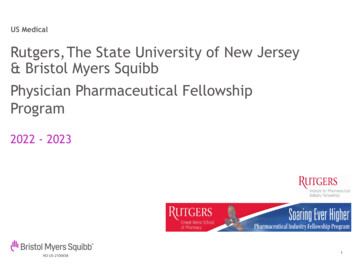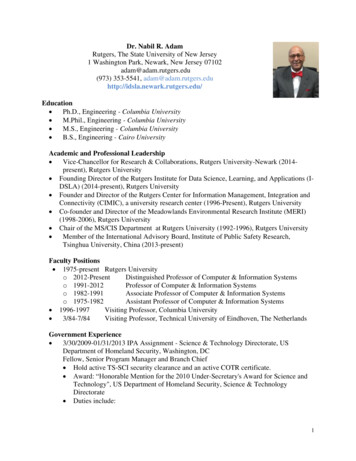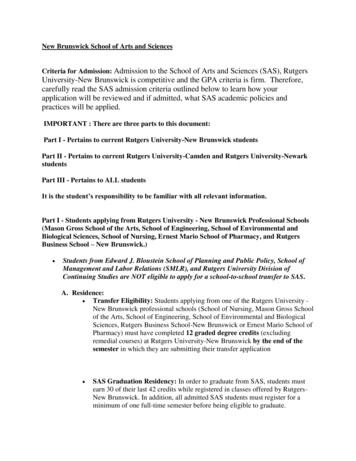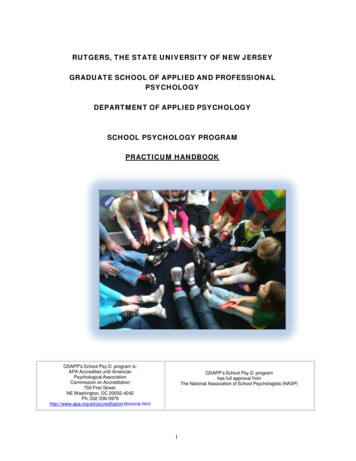
Transcription
RUTGERS, THE STATE UNIVERSITY OF NEW JERSEYGRADUATE SCHOOL OF APPLIED AND PROFESSIONALPSYCHOLOGYDEPARTMENT OF APPLIED PSYCHOLOGYSCHOOL PSYCHOLOGY PROGRAMPRACTICUM HANDBOOKGSAPP's School Psy.D. program is:APA Accredited until AmericanPsychological AssociationCommission on Accreditation750 First Street,NE Washington, DC 20002-4242Ph: ctoral.htmlGSAPP's School Psy.D. programhas full approval fromThe National Association of School Psychologists (NASP)1
RUTGERS SCHOOL PSYCHOLOGYPROGRAM PRACTICUM HANDBOOKOverviewWhile enrolled in the School Psychology Program at the Graduate School for Applied andProfessional Psychology (GSAPP) at Rutgers University, students complete practica that aresequential, cumulative, and graded in complexity in order to achieve competencies designatedby core faculty. These practica experiences begin in the second semester of the first year andcontinue for a minimum of two additional years. In total, students will complete a minimum oftwo-and-a-half years and 1150 hours of practica training, although advanced level students(i.e., previous Master’s degree) may be able to waive some of these requirements.During the first school-based practicum, taken in the Spring semester of the first year in theprogram, students are placed in one of our partner school districts. Activities includeobservation of a range of school structures and processes, such as regular education classes,special education classes, resource rooms, meetings and consultation sessions between schoolpsychologists and teachers, meetings between school psychologists and parents, child studyteam meetings, meetings of the intervention and referral services team, and school-widefaculty meetings. Students also engage in psychological assessment activities and reportwriting, and may gain initial experience with providing counseling services.During the second year practicum, students continue their placements in one of the partnerschool districts. They complete full psychological evaluations, participate in child study teammeetings and intervention and referral services team meetings, engage in consultation withteachers and parents, and implement evidence-based prevention and intervention programsfor individuals and/or groups.In the third year of the program, students enroll in advanced practica that may involve work inthe partner school districts and/or a specialized practicum in an alternative practicum setting.Consistent with the sequential and cumulative aspects of the practicum experience, the goal ofthe third year of practicum is to refine professional practice skills, with an emphasis on systemsand preventive interventions, and/or to develop advanced specialty skills. Those continuingtheir work in partner school districts will develop and implement intervention or preventionprograms for small groups, classrooms or schools, and engage in the full range of servicesprovided by practicing school psychologists. Those working in an alternative practicum settingmay seek to develop advanced skills in working with populations such as autistic children, orfamilies of children with developmental disabilities. They also may develop advanced skills inproviding a specific type of psychotherapeutic intervention, such a cognitive-behavior therapy,or they may develop advanced skills in systems-level prevention in schools.Because practicum experiences are integrated with coursework beginning in their initial andsubsequent practica, students are afforded the opportunity to obtain an in-depthunderstanding of the roles and functions of school psychologists and of the context of the2
school, and to increase their level of competence in professional practice through the deliveryof psychological services in a school setting. This is done in a sequential manner as describedabove. As students take professional practice courses, they are provided with opportunities inthe practicum setting to use the skills learned in those courses, to refine skills learned inpreviously completed courses, and to integrate multiple skills in order to solve problems. Alongwith each practicum course and the individual supervision by doctoral level psychologists that istypically provided at the practicum site, students participate in a Group Supervision course foreach semester in which they are enrolled in practicum. This supervision course provides weeklygroup supervision of students by School Psychology Program faculty members and aims toprovide input and feedback regarding student practicum work, to strengthen the professionalidentity of students as a school psychologist, and to enhance student self-awareness andunderstanding of the self as a mediating variable in the delivery of services.Through this work, students develop initial competence in all basic aspects of the professionalfunctioning of school psychologists, develop a data-based approach to professional problemsolving, develop an understanding of the importance of using empirically supportedinterventions, learn to integrate the various aspects of school psychology practice to deal withproblems of students in educational settings, and are exposed to a variety of school-basedissues that impact the development of children and youth.3
SCHOOL PSYCHOLOGY PROGRAM AIMS AND COMPETENCIESStudents are evaluated by field-based supervisors across a series of competencies embeddedwithin 10 key aims.Aim 1 (Research): To understand and engage competently in research and other scholarlyactivities that contribute new scientific, psychological, or professional knowledge.Competency 1.1 Selects and implements research and evaluation methodsappropriate for defining and clarifying problems, formulating research questions andhypotheses, and generating new scientific or professional knowledge.Competency 1.2 Critically interprets, uses, and disseminates research and empiricalfindings to address problems, decision situations, or gaps in knowledge.Aim 2 (Ethics and Legal Standards): To understand and apply ethical and legal principles to thepractice of psychology in schools and other professional psychology contexts.Competency 2.1 Demonstrates knowledge of and adherence to APA ethicalguidelines, relevant laws governing psychological practices, and a sound ethicaldecision-making process to resolve ethical dilemmas and conflicts.Aim 3 (Individual and Cultural Diversity): To display adequate knowledge and professionalskills to address issues of human diversity, especially in terms of students in schools, and todevelop skills for working with individuals and groups from diverse racial, cultural, ethnic,linguistic, socio-economic, gender-related, and other backgrounds.Competency 3.1 Demonstrates knowledge of current theoretical and empiricalfoundations and models of human diversity, and an awareness of how personal biasesand cultural histories influence interactions with individuals and groups.Competency 3.2 Demonstrates the ability to consider and integrate cultural anddiversity concepts in the design, implementation, and evaluation of programs, products,and services that relate to professional psychology practice and research.Aim 4 (Professional Values and Attitudes): To maintain self-awareness, beliefs, and behaviorsthat reflect the values and principles of school psychology.Competency 4.1 Exhibits appropriate professional attitudes and behaviors, includingrespect and concern for the welfare and well-being of others, personal accountability,and maintaining high standards for professional practices.Competency 4.2 Exhibits behaviors that reflect an openness and responsiveness tofeedback, and a desire to maintain self-awareness of and active engagement inprofessional and personal growth activities.4
Aim 5 (Communication and Interpersonal Skills): To demonstrate effective interpersonal andcommunication skills within schools, other professional practice settings, and communitycontexts, in the service of psychological development and educational achievement of childrenand adolescents.Competency 5.1 Develops and maintains effective relationships with a wide range ofindividuals including students, teachers, parents, other health service professionals, andother stakeholders in the provision of psychological services.Competency 5.2 Demonstrates skills in producing, comprehending, and integratingoral, nonverbal, and written communications across a range of situations, populations,and systems.Aim 6 (Assessment): To demonstrate knowledge of and skills in administering and interpretingevidence-based assessments.Competency 6.1 Formulates and conducts psychological assessments that aretechnically adequate, accurate, identify needs and strengths, and inform decisionmaking and interventions.Competency 6.2 Interprets, uses, and communicates assessment results that guidecase conceptualization, classification, and recommendations, and that demonstrateunderstanding of the multiple systems impacting student functioning.Aim 7 (Intervention): To understand and apply evidence-based interventions across a range ofprofessional contexts and populations.Competency 7.1 Selects, develops, implements, and evaluates evidence-basedinterventions in classrooms, schools, and other agencies or mental health organizationsthat are relevant to the child/adolescent, problem, and context.Competency 7.2 Applies the relevant literature to clinical decision making, andmodifies evidence-based approaches effectively when empirical data is lacking for aparticular population, problem, or context.Aim 8 (Supervision): To understand and apply knowledge of effective supervision practicesregarding the provision of school psychology practices.Competency 8.1 Applies knowledge of effective principles of supervision inprofessional settings and activities with other graduate students in didactic and/orprofessional contexts.Aim 9 (Consultation and interprofessional/interdisciplinary skills): Effectively collaborates withprofessionals and stakeholders to address problems, share knowledge, or to promote highquality professional activities.5
Competency 9.1 Demonstrates knowledge of and respect for the diverse roles, beliefs,and competencies of professionals and stakeholders working in schools.Competency 9.2 Provides evidence-based consultation, guidance, and technicalassistance to teachers, administrators, parents, other health service professionals toidentify educational, social, and emotional problems and needs and to determineeffective ways to address those problems and needs.Aim 10 (Systems-based practices): To understand and apply a systems framework to schoolpsychology research and practice at the individual and organization levels.Competency 10.1 Demonstrates an understanding of the impact of multiple systems onstudent development and functioning, and utilizes this knowledge when deliveringassessment, intervention, consultation and/or other professional services.Competency 10.2 Demonstrates an understanding of schools and educationalenvironments, including knowledge of principles of quality instruction, the profession ofteaching, and regular and special education policy. (Rev 2017)6
The Practicum ExperienceThe GSAPP School Psychology Practicum Coordinator will work with all students regarding theschool-based and advanced practica experiences. The Coordinator will: provide ongoing communication with students and supervisors regarding practicumrequirements and student /supervisor performance and activities;assign students to the first School Psychology Practicum site based on determination ofstudent interests and fit with district specifications;conduct periodic visits to the school district to meet with supervisors and/or students.Some meetings will include both student and supervisor to review student progress andpracticum experiences;provide additional supervision of student’s cases, reports and programs on an as neededbasis;document student’s performance at time of conference and shares any concerns withSchool Psychology faculty;coordinates yearly Supervisor’s Luncheon to be held at the Center for Applied Psychologyto elicit feedback about practicum;attempt to resolve any problems between supervisor and student;provide additional support and training opportunities to the district as requested bysupervisors;create opportunities for supervisors to attend colloquia and workshops at RU at reducedor no‐cost;review all mid‐year and end of year evaluations;assign grades for practicum experiencesA. School-Based Practicum Experience (9 credits – 3 semesters)School psychology students begin their practicum training during the Spring semester of theirfirst year. This is a three-semester sequence of field experience in a local public school district,continuing into the Fall and Spring of the second year of studies. Students accrue experienceunder the supervision of certified, doctoral level school psychologists.The overarching goal of the first- and second-year school placement is to familiarize studentswith the CST and role of school psychologist. This practicum provides experience in thoseactivities for which students must acquire competence to become certified as schoolpsychologists by the New Jersey State Department of Education. Exposure to non-CST roles forschool psychologists is possible, but must occur in conjunction to the CST role, in order to meetNJ Dept. of Ed certification requirements. For this practicum, students are placed in partneringschool districts by the School Psychology Practicum/Internship Coordinator, based on studentinterest in: urban/suburban/rural settings, Pre-K, elementary, middle, and high school levels,and professional activities. Prior to placement, the student will generally be required tocomplete requirements specific to each district to obtain Board of Education approval. Therequirements are district specific and may include: fingerprinting, criminal background check,substitute teacher certification, TB testing, and spending part of a day observing in district.7
The school-based practicum is required of all beginning level and BA students entering theSchool Psychology program; however, “Advanced” students entering the program with theirschool psychologist certification may waive these 9 credits of practicum with appropriatedocumentation. For those students entering the School Psychology program at the BA leveland/or without prior graduate training in school psychology, this initial practicum begins inJanuary (Spring term) of the second semester of Y e a r 1 coursework.While specific practicum experiences are not guaranteed at each site, the faculty recognize thebenefit of completing course requirements in the practicum setting. The ability to utilize realworld cases and experiences enhances students’ ability to learn in the classroom, and createsmore personally meaningful experiences that bridge theory, research, and practicum. Studentsare encouraged to advocate for experiences of personal interest in a professional manner andto seek assistance from the School Psychology Practicum/Internship Coordinator when needed.Students register for 150 hours for practicum and for the appropriate GSAPP-based supervisioncourse. Students are responsible for tracking all of their hours and activities using Time2Trackso that both GSAPP and their practicum supervisors can review these hours.Because of a high level of ethical responsibility to children and families, student readiness toundertake the School-Based Practicum includes: 1) satisfactory completion of Introduction toSchool Psychology (grade of B or above) as this course introduces students to the New JerseyAdministrative Code 6A:14, which addresses special education, 2) satisfactory completion ofCognitive Assessment course (grade of B or above), including all competency exams, and 3)overall satisfactory academic performance and behavior in the School Psychology program.Students on academic probation may not be allowed to register for practicum and/or may haverestrictions on the activities in which they can engage.Students will complete a Practicum Contract within the first month of practicum documentingtheir proposed activities. The contract forms the basis for evaluating the student’s performanceat the end of each semester, as well as helping the student and supervisor plan appropriatepracticum activities. Both the contract and progress report are completed on line, but have to besigned by both the student and site supervisor; instructions may be found toward the end of thismanual. Students are also responsible for keeping a weekly practicum log of their time indifferent activities using the online program Time2Track.First Year (Spring Semester Only)The initial entry into a new practicum site includes time to learn about the culture of the schoolthrough observation. Depending upon the district, the amount of time students spendobserving will vary. Practicum activities include observation of a range of school structures andprocesses, such as regular education classes, special education classes, resource rooms, meetingsand consultation sessions between school psychologists and teachers, meetings between schoolpsychologists and parents, child study team meetings, meetings of the intervention and referralservices team, crisis intervention, and school‐wide faculty meetings.8
Opportunities for hands-on activities may include cognitive assessment and counseling.Students may engage in psychological assessment activities and report writing, once they havepassed Cognitive Assessment. A maximum of four assessments may be conducted during thisexperience. Students may co‐facilitate groups with either the school psychologist or other CSTand school personnel, such as guidance counselors and conduct functional behavioralassessment (FBA’s).Related Goals of First Semester of School-Based Practicum: Learn about the culture of a district through some time spent observing schoolpsychologists/supervisor and other CST personnel in meetings, conducting testing,writing IEPs, etc. Conduct (either in-part, or whole, depending upon appropriateness ofcase) 1-2 cognitive assessmentsConduct (either in part, or whole) 1-2 social-emotional assessments involvingbehavioral/objective and projective assessmentsConduct 1 FBAObserve at least 4 CST meetings such as: eligibility meetings, initial identificationmeetings, IEP revisions, etc.Observe 1-2 I&RS meeting/sIndividual and/or group counseling, as appropriateSecond Year (Fall & Spring)During the second year of the 9-credit sequence of school-based practicum, students continue theirplacements in their assigned school district for the entire academic year. They complete fullpsychological evaluations, participate in child study team meetings and intervention and referralservices team meetings, engage in consultation with teachers and parents, and implementevidence‐based interventions for individuals, including individual and group counseling, and evidence‐based prevention or intervention programs for groups. Classroom based programming, crisisintervention, behavioral assessment and development of behavior improvement plans may alsooccur.Second year students are required to complete one day of practicum a week though they mayelect to take on an additional practicum of their choosing. This additional practicum does notfulfill requirements of the Advanced Practicum required during the 3rd year in the programRelated Goals of Second Year of School-Based Practicum: In depth exposure to and participation in CST process, as appropriate: for example,eligibility meetings, IEP writing (at least in part), giving feedback to parents,manifestation determination, out of district visitsCarry 3-4 psychological testing cases which include cognitive testing and socialemotional-behavioral assessment (either in part or the entire case, as deemedappropriate by supervisor)If permitted by district LDTC, conduct 1 psychoeducationalevaluation (learning/achievement evaluation) during Spring semester of second year9
Conduct an evidence-based intervention, such as individual/group counseling,classroom-based program (at least 2 cases)Exposure to crisis interventionBehavioral observation and/or FBAProvide teacher consultationParticipate in I&RS and/or subsequent intervention activitiesResponsibilities of Supervisor for School-Based Practicum (all 3 semesters): Weekly supervision at dedicated time (1 hour)Co-develop and approve Practicum ContractContact School Psychology Practicum Coordinator regarding any concerns aboutstudent’s performanceReview, with student, their log of practicum hours and activitiesAt the end of each semester, complete on-line evaluation of student using GSAPP SchoolPsychology Practicum Competency ratings (see pp. 4-6 of this Handbook):First semester (January-June): In May, prior to end of semester, complete on-line End ofYear evaluation and review with studentSecond semester (September-December): In December, prior to end of semester,complete on-line Mid-Year evaluation and review with studentThird semester (January-June): In May, prior to end of semester, complete on-line Endof Year evaluation and review with studentResponsibilities of Student in School-Based Practicum (all 3 semesters): Completion of 120 hours of practicum per semesterCompletion of a Group Supervision course at GSAPP per semester. ALL students inpracticum are required to be register for Supervision in School Psychology (Year 1; 1credit) and Advanced Group Supervision (Year 2; 3 credits each semester).Documentation of all practicum hours and activities using Time2Track(www.time2track.com). Log should be uploaded to GSAPPweb database at the end ofevery semester.Schedule in advance with supervisor, including any changes. Attendance is based onSCHOOL DISTRICT calendar, not Rutgers calendar. Practicum continues into June withstudents maintaining an ethical obligation to provide continuity of care to clients.Appropriate termination of services should be developed with practicum supervisor.Professional demeanor including appropriate attire, responsiveness to supervision,promptness, and use of technology (cell phones, laptops) is expected at all timesAt end of every semester, complete the on-line School Psychology Student PracticumEvaluation Form in GSAPPweb.10
B. Advanced practicum (12 credits; 3rd year and beyond)Third Year (Fall & Spring)During the third year of practicum, students are required to complete two days of practicum eachsemester (6 credits each semester). Students may spend two days a week in one setting or select twodifferent settings. Third year students are not required to undertake practicum in the public schools,though they may choose to do so. Students may continue to work in the partner school districts ormay choose a specialized practicum from one of the additional practicum settings.Along with each practicum course and the individual supervision by doctoral level psychologiststhat is provided at the practicum site, students participate in Advanced Supervision in SchoolPsychology for each semester of third-year practicum (similar to the requirements of second-yearpracticum). This supervision course provides weekly group supervision for students by SchoolPsychology Program faculty members and aims to provide input regarding student practicumwork, to strengthen professional identity as a school psychologist, and to understand andenhance the use of self as a mediating variable in the delivery of services. Students are requiredto develop a written analysis of their professional growth at various points in the semester.Related Goals of Third Year Practicum: Refine professional practice skills, with an emphasis on systems and preventiveinterventions, and/or toDevelop advanced specialty skills.Develop and implement intervention or prevention programs for small groups,classrooms or schools, and engage in the full range of services provided by practicingschool psychologists.Develop advanced skills in working with populations such as children with autism,families of children with developmental disabilities, or children in foster care.Develop advanced skills in providing a specific type of psychotherapeutic interventionsuch as cognitive‐behavior therapy or play therapy, orDevelop advanced skills in systems‐level prevention in schools.Responsibilities of Supervisor for Advanced Practica: Weekly supervision at dedicated time (1 hour)Co-develop and approve Practicum ContractContact School Psychology Practicum Coordinator regarding any concerns aboutstudent’s performanceReview, with student, their log of practicum hours and activitiesAt the end of each semester, complete on-line evaluation of student using GSAPP SchoolPsychology Practicum Competency ratings (see pp. 4-6 of this Handbook).11
Responsibilities of Student in Advanced Practica: Completion of 120 hours of practicum per semesterCompletion of a Group Supervision course at GSAPP per semester. ALL students inpracticum are required to be registered for Advanced Group Supervision (Year 2; 3credits each semester).Documentation of all practicum hours and activities using Time2Track(www.time2track.com). Logs should be uploaded to GSAPPweb database at the end ofevery semester.Schedule in advance with supervisor, including any changes. Attendance is based on thecalendar of the agency or school district rather than Rutgers calendar. Practicumcontinues into June with students maintaining an ethical obligation to provide continuityof care to clients. Appropriate termination of services should be developed withpracticum supervisor.Professional demeanor including appropriate attire, responsiveness to supervision,promptness, and use of technology (cell phones, laptops) is expected at all timesAt end of practicum, complete the on-line School Psychology Student PracticumEvaluation Form in GSAPPweb.C. Clinic practicum experiences (all semesters in first three years of program)In the interest of providing a comprehensive and rich training experience for school psychologystudents, the GSAPP School Psychology Program requires students to participate in a minimumof 3 credits of practica experiences through the GSAPP Psychological Services Clinic. Theseexperiences provide students the opportunity to master a range of professional psychologyskills in a clinic-type setting. These credits are earned by work at the Clinic over the course ofsix semesters (.5 credits each semester). Students will be exposed to a rich curriculum thatinvolves intake assessments, psychoeducational assessments, and therapeutic services. Studentexperiences in the Clinic are developmentally sequenced (i.e., experiences are matched tostudents’ developmental progression through coursework and the program) and are typicallyaligned with didactic courses (see Student Handbook for more details about the types ofexperiences, responsibilities of the student, and responsibilities of the Clinic regardingsupervision).12
RUTGERS, THE STATE UNIVERSITY OF NEW JERSEY . GRADUATE SCHOOL OF APPLIED AND PROFESSIONAL PSYCHOLOGY . DEPARTMENT OF APPLIED PSYCHOLOGY . SCHOOL PSYCHOLOGY PROGRAM PRACTICUM HANDBOOK . GSAPP's School Psy.D. program is: APA Accredited until American Psychological Association Commission on Accreditation . 750 First Street, NE Washington, DC 20002 .


